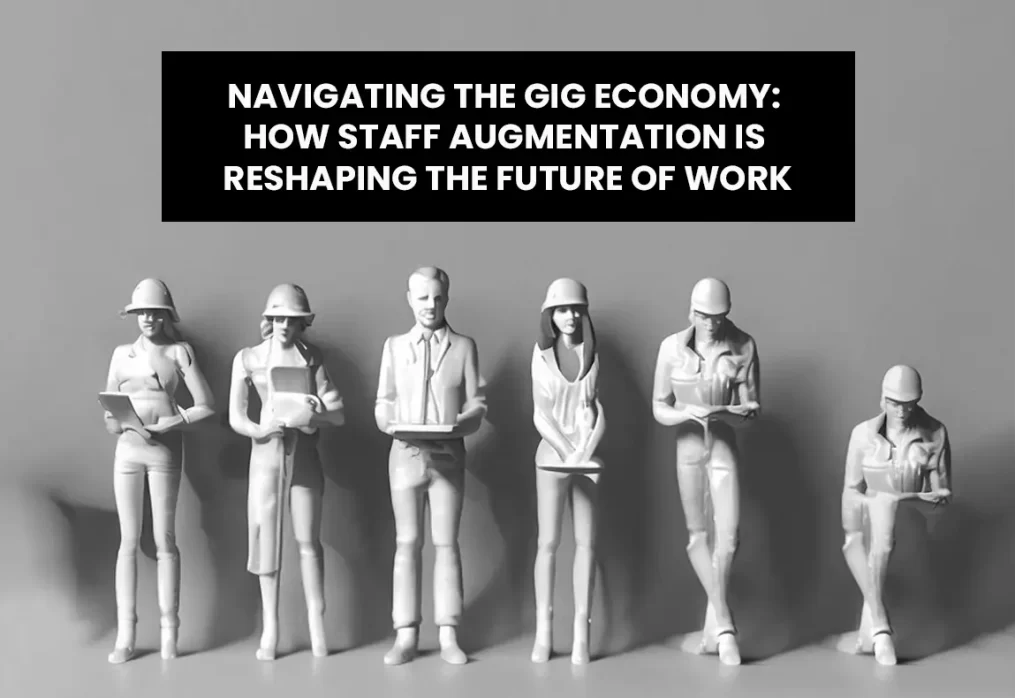Navigating the Gig Economy: How Staff Augmentation is Reshaping the Future of Work
The Gig Economy and Staff Augmentation refers to the fusion of flexible, freelance work models with traditional business structures, enabling organizations to quickly scale and adapt in an ever-evolving marketplace. This dynamic analysis elucidates how businesses, through staff augmentation, strategically tap into the gig economy’s flexible workforce. It offers an in-depth understanding of how this contemporary model alters the traditional work paradigm, permitting organizations to remain agile, efficient, and competitive. As businesses adapt to ever-changing market demands, this exploration provides critical insights into the symbiotic relationship between the gig economy and staff augmentation.
Let’s explore more to learn more.
The Emergence of the Gig Economy: A Historical Perspective
The Emergence of the Gig Economy
A Historical Perspective unravels the roots of today’s gig economy, tracing its development from early independent work arrangements to its modern, technology-driven state. The digitization of various industries has fueled this rise, providing platforms that connect businesses with freelancers globally. It outlines critical socio-economic factors that encouraged workers to seek more flexible, non-traditional employment, leading to this seismic shift in work culture. This evolution is not only changing the fabric of employment but is also impacting economic structures and societal norms, leading to a new, fluid era of professional engagement.
Understanding Staff Augmentation: Defining the Concept
Defining the Concept is a thorough exploration of how staff augmentation operates within the gig economy, reshaping the future of work. It demystifies the Concept, portraying staff augmentation as a flexible workforce model that enables businesses to meet specific goals by leveraging gig workers. Organizations can quickly adapt to market fluctuations and project demands by strategically integrating this model. This fluid approach to staffing fosters agility, strengthens capacity, and cultivates innovation, defining a new way of leveraging staff augmentation in the gig economy. It propels us into an era where work is no longer confined to traditional boundaries.
The Symbiosis of the Gig Economy and Staff Augmentation
The Symbiosis of the Gig Economy and Staff Augmentation delves into the collaborative relationship between these two contemporary elements shaping the world of work.
Flexibility and Agility
The gig economy thrives on flexibility, with workers choosing when, where, and how they work. Staff augmentation dovetails with this flexibility, allowing businesses to scale up or down quickly based on project demands. This agility is crucial for organizations navigating volatile markets.
Access to Specialized Skills
Staff augmentation taps into the gig economy to provide businesses with specialized skills on demand. This symbiotic relationship enables firms to remain competitive without the long-term commitment of full-time hires.
Cost Efficiency
Leveraging the gig economy through staff augmentation can lead to significant cost savings. Businesses can access top-tier talent for specific projects without bearing the whole expense of traditional employment, such as benefits and overhead costs.
Innovation and Diversity
The gig economy is a melting pot of diverse skills and experiences. Businesses can harness this diversity through staff augmentation, fostering innovation and fresh perspectives.
Future of Work
The symbiosis of the gig economy defines the future of work. Integrating these two elements creates a more dynamic, responsive, and efficient workforce mode as businesses shift towards project-based structures.
The Role of Staff Augmentation in Today’s Business Environment
There are many roles for staff augmentation, some of which are the most important.
Adaptability
In today’s dynamic business environment, staff augmentation fosters adaptability. Organizations often need to scale quickly or acquire specialized skills on a project basis. Staff augmentation offers a flexible approach to filling these temporary or specialized roles, reducing the risk and cost associated with permanent hires.
Competitive Advantage
With access to a global talent pool, staff augmentation enables businesses to obtain specialized expertise and industry-specific knowledge that may be scarce locally. This can create a competitive advantage, leading to improved innovation and increased productivity.
Cost Efficiency
Staff augmentation minimizes costs related to recruitment, training, benefits, and downtime between projects. By hiring staff as needed, businesses can maintain operational efficiency and budget control, proving invaluable in today’s uncertain economic landscape.
How Staff Augmentation Taps into the Gig Economy
Staff augmentation leverages the gig economy by allowing businesses to contract independent professionals per project. This flexible model enables access to specialized skill sets as needed, reducing overhead costs and enhancing productivity. Companies can swiftly scale their workforce up or down, meeting project demands without long-term commitments. Thus, staff augmentation taps into the gig economy’s potential for flexibility, cost-effectiveness, and access to a global talent pool.
Advantages of Navigating the Gig Economy through Staff Augmentation
Navigating the gig economy through staff augmentation is reshaping the future of work, offering numerous benefits to companies and organizations.
Flexible Workforce Model
The gig economy facilitates a flexible workforce model. Staff augmentation allows companies to quickly scale their teams up or down based on project needs, providing unprecedented adaptability.
Access to Global Talent Pool
Leveraging staff augmentation in the gig economy opens doors to a vast, global talent pool. This allows companies to handpick experts suited to their specific project requirements.
Cost-effectiveness
With staff augmentation, businesses only pay for the skills and time they need, eliminating overhead costs associated with full-time employees.
Skill Diversity
Staff augmentation allows businesses to access a broad spectrum of skills and expertise, encouraging innovation and boosting competitiveness.
Reduced Training Time
Gig workers are often experts in their fields, requiring less training time, which leads to increased productivity and efficiency.
Risk Management
By using gig workers, companies can better manage risks associated with permanent hires, such as unexpected departures or underperformance.
Faster Project Completion
With the ability to rapidly onboard experienced professionals, project timelines can be significantly reduced.
Focus on Core Business Functions
With gig workers handling specialized tasks, companies can devote more resources and attention to their core business functions, ultimately driving growth and success.
The Future of Work: How Staff Augmentation is Reshaping Businesses
Staff augmentation reshapes the future of work, fostering flexibility and adaptability in modern business models. Businesses increasingly leverage this strategy to access a global talent pool, ensuring they have the specific skills needed for each project. This model reduces overhead costs, increases efficiency, and accelerates project timelines. By utilizing gig workers, businesses can focus more on core functions, boosting growth. Thus, staff augmentation transforms traditional work paradigms, paving the way for a dynamic, cost-effective, and innovative business environment.
Overcoming Challenges: Best Practices for Implementing Staff Augmentation
Implementing staff augmentation comes with its own set of challenges. However, by following certain best practices, businesses can effectively overcome these hurdles:
- Augmentation: A clear understanding of project needs, scope, and goals is paramount. Regular communication with the augmented staff helps mitigate better understanding and foster cooperation. Leveraging digital communication tools can ensure smooth and effective communication across different locations and time zones.
- Define Expectations: Clearly define the gig workers’ tasks, deliverables, and timelines. A well-articulated job description, project objectives, and expected outcomes help set the right expectations.
- Choose the Right Partner: Partner with a reliable, experienced staff augmentation firm. They can provide a vetted, diverse talent pool, reducing the risk of unqualified hires and ensuring a better match for your project’s needs.
- Invest in Onboarding: Though gig workers are typically skilled, an effective onboarding process helps them understand the company culture and project specifics. This can shorten the learning curve and enhance productivity.
- Legal Compliance: Comply with all local and international labor and tax laws when hiring gig workers. Understanding and adhering to these regulations is vital to avoiding legal issues.
Predictions for the Future: The Gig Economy and Staff Augmentation in the Next Decade
The gig economy will significantly reshape the work world in the next decade. As businesses increasingly seek agility and specialized skills, the demand for gig workers is set to rise. Advances in technology will further enable remote work, enhancing global talent accessibility. Staff, There will be a contingency plan and a strategic approach to achieving operational efficiency. Furthermore, regulatory frameworks will likely evolve to protect gig workers’ rights. Overall, businesses will witness a shift from traditional employment models towards more flexible, project-based engagements, redefining workforce dynamics.
Concluding Words
The rise of the gig economy has unlocked new dimensions in the world of work, with staff augmentation at its helm. Staff augmentation enables businesses to adapt quickly, improve efficiency, and innovate effectively by providing access to a global, flexible workforce. In essence, the synergy between the Gig Economy and Staff Augmentation is reshaping the existing work paradigms and crafting the future of work, leading us toward a more dynamic and efficient business landscape.


